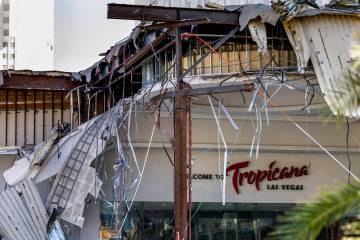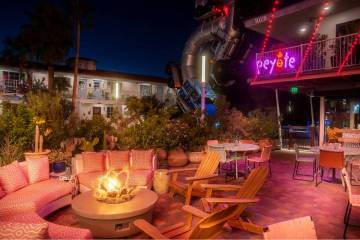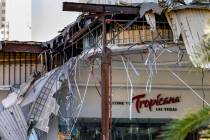Report: Illinois investigating MGM Mirage’s partner in Macau case
It's starting to feel like open season on local casino owners' business ties in China's lucrative Macau gaming market.
But so far, Nevada's gaming regulators remain mum on whether they'll join the hunt by boosting scrutiny of operators' overseas connections.
Word of the latest look into gamers' Macau links comes from The Wall Street Journal, which wrote Friday that the Illinois Gaming Board is investigating the business partnership between MGM Mirage and Hong Kong businesswoman Pansy Ho. The two parties jointly own MGM Grand Macau.
The Illinois board's inquiry follows a March 17 finding by the New Jersey Division of Gaming Enforcement that MGM Mirage's affiliation with Ho wasn't acceptable under the state's regulations. Ho's father, Stanley Ho, is alleged to have extensive ties to organized-crime groups in China, and because Pansy Ho relies on her father and his money, she could face undue influence from him, the New Jersey agency said. Regulators in Michigan, where MGM Mirage has a Detroit casino, have initiated an inquiry into the partnership as well, The Wall Street Journal reported.
MGM Mirage isn't the only local casino operator facing questions about its Macau connections.
A report by Reuters on Tuesday delved into a possible connection between the Las Vegas Sands Corp., which operates The Venetian and Palazzo, and a Chinese businessman suspected of ties to organized crime. The article said the businessman ran a VIP room at the company's Sands Macau hotel-casino and invested in a junket operator that steers business to the property. Las Vegas Sands officials have denied the accusations.
Nevada gaming regulators didn't respond to requests for comment on whether they'd look into Reuters' allegations.
Nor did Nevada gaming regulators reply to an e-mail Friday seeking comment on whether they would revisit their 2007 approval of the Pansy Ho-MGM Mirage joint venture. Board members said after the New Jersey decision that they carefully vetted Ho before they licensed her, and they found the partners' contract included enough safeguards to keep a third party from influencing operations.
"To my knowledge, the joint venture has not brought any discredit to the state," Gaming Control Board Chairman Dennis Neilander told the Review-Journal in March.
This latest development from the Land of Lincoln might force the board to revisit its conclusion, said Bill Eadington, an economics professor and director of the Institute for the Study of Gambling and Commercial Gaming at the University of Nevada, Reno. Nevada law requires gaming regulators to monitor whether partnerships between local casino operators and overseas businessmen could hurt the state's reputation.
"If one regulatory body makes a very serious accusation, as New Jersey did, it is pretty hard for others to totally ignore it," Eadington said. "Nevada had already ruled on this case, but it may turn out that Nevada will, at some point, have to go back and look again."
But Bill Thompson, a professor of gambling studies at the University of Nevada, Las Vegas, said Illinois' move was more likely about political posturing.
The state stumbled in granting its 10th and final casino license, taking a decade to award the permit after repeated legal problems. One potential host village had alleged mob ties, and horse-trading involved questionable campaign donations. The trial of disgraced former Gov. Rod Blagojevich, accused of trying to sell President Barack Obama's former U.S. Senate seat, is scheduled to begin in June, so corruption is top-of-mind for Illinois regulators, Thompson said.
"They want to be waving a flag, saying, 'We're purer than the pure, look how clean we are,' " Thompson said.
Thompson said he doesn't believe Illinois' actions should force a new MGM Mirage-Ho probe in Nevada.
"What they (control board members) should tell the world is, 'We judge on performance. We've given the go-ahead, and we're certainly going to be watching operations, but we're not going to open the books we've already opened,' " he said.
It won't likely be the last time questions arise regarding the integrity of local operators' Macau connections.
Since it began accepting competitive bids for gaming operations in 2002, Macau has brought the potential for embarrassment to stateside gaming agencies and operators, Eadington said. Macau's regulatory regime essentially started from scratch, after all, with its overseers attempting to transform the region's gambling scene from a murky gaming underworld mostly under Stanley Ho's control to a reputable casino market with above-board rules cleansed with the sunlight of transparency.
But some observers say implementation of Macau's regulations lags, and that makes operators' partnerships there a sensitive area for the Nevada Gaming Control Board. Roughly 70 percent of Macau's casino business comes from junket operators, lightly regulated independent contractors who funnel patrons into gambling halls. What's more, collecting on casino debts is illegal in China. Such practices and laws mean much of the country's gambling activity happens outside the law.
Those legal gray areas create problems for Nevada's regulators because three of Macau's six casino concessionaires maintain Silver State headquarters.
Thompson agreed that gaming operations in Macau come fraught with pitfalls.
"In my mind, all operators in Macau are going to have some links to bad people one way or another, either as loan agents, sharks or operators of prostitutes right outside the door, because that's sort of the history of the place," Thompson said. "If the Sands or anyone else has people who are running things when something bad comes up, they should be warned or, if need be, disciplined. but I think (regulators) have to look at the operations. As long as the gaming is honest and the dollars are being accounted for, it's just a matter of continued surveillance."
Other jurisdictions have gone beyond surveillance, though. In New Jersey, MGM Mirage agreed to sell its half of Atlantic City's Borgata hotel-casino to avoid running afoul of the state's regulations.
Local operators probably won't have to choose between local casinos and Macau operations, Eadington and Thompson agreed. And that's a good thing for those companies, because Macau has yielded more gaming revenue than Las Vegas since 2006. The market kept some operators afloat as visitor volumes and tourist spending plummeted in Las Vegas during the recession.
Nevada is so dependent on its big gaming companies that the state would be hard-pressed to take punitive action against the businesses unless it had strong reasons to do so, Eadington said. It would take a smoking gun involving actual practices rather than associations.
Thompson also said the state Gaming Control Board probably wouldn't act unless it found "grossly wrong" practices in Macau.
Contact reporter Jennifer Robison at
jrobison@reviewjournal.com or 702-380-4512.




























